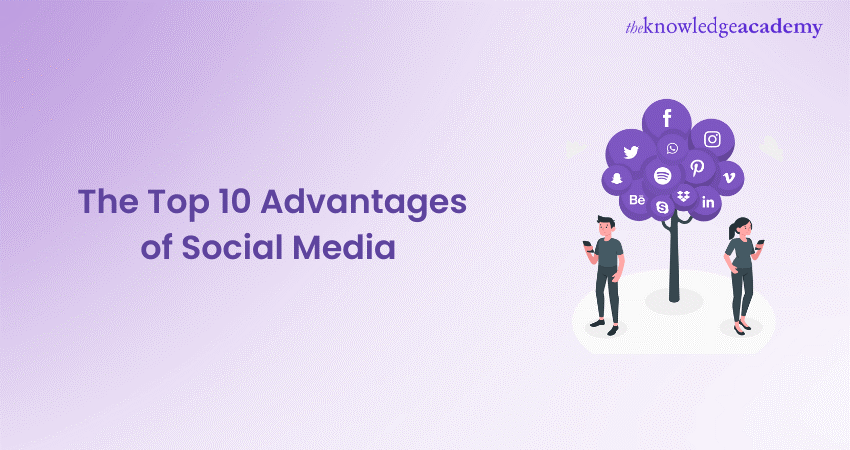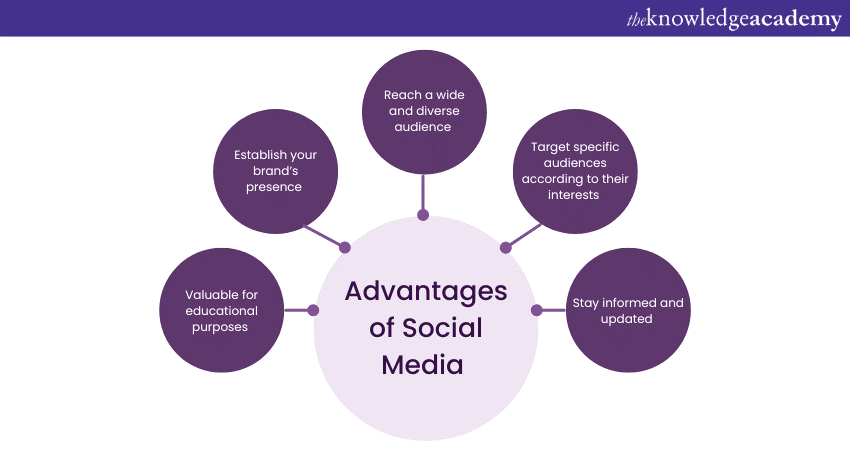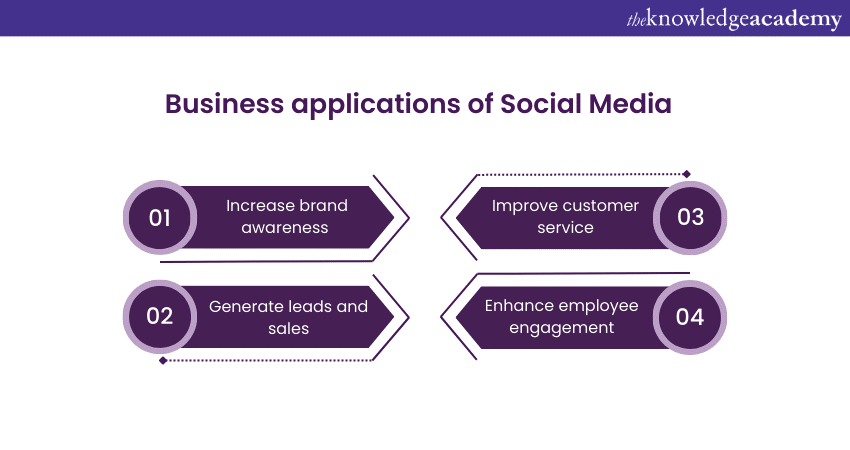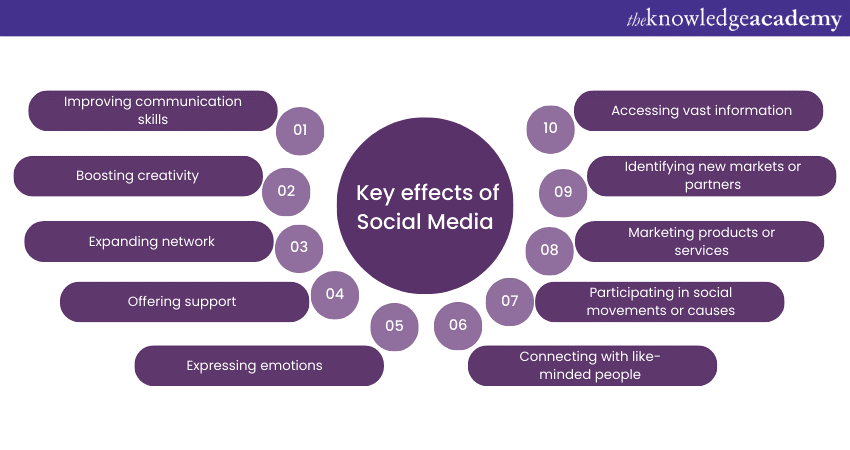We may not have the course you’re looking for. If you enquire or give us a call on 01344203999 and speak to our training experts, we may still be able to help with your training requirements.
Training Outcomes Within Your Budget!
We ensure quality, budget-alignment, and timely delivery by our expert instructors.

According to SmartInsights, the average daily time spent using Social Media is 2 hours and 24 minutes. That’s a lot of time but also a lot of opportunities. Social Media platforms are not just for scrolling and liking. They are also for expressing yourself, developing your skills, connecting with others, promoting your brand, learning new things, having fun, and more. In this blog, we will explore the top 10 Advantages of Social Media in various aspects of your life.
Table of Contents
1) Social Media Overview
2) 10 Advantages of Social Media
3) Business applications of Social Media
4) The key effects of Social Media
5) Conclusion
Social Media overview
Social Media is a term that refers to online platforms and applications that allow people to create and share content as well as interact with each other. Social Media, where we can communicate, learn, and entertain ourselves through various channels, has become integral to our lives.
Some of the most popular Social Media platforms are Facebook, Twitter, Instagram, YouTube, TikTok, LinkedIn, and Snapchat. Each platform has its features, functions, and audiences. Users can use Social Media for various purposes, such as personal expression, professional development, social networking, marketing, education, entertainment, and more. However, Social Media can also have positive and negative effects on individuals and society.
Top 10 Advantages of Social Media
Here are the top ten Advantages of Social Media:

1) Valuable for educational purposes
One of the main Advantages of Social Media is that it can be a valuable resource for learning and education. Social Media can provide access to vast amounts of information, such as news, articles, videos, podcasts, and more. Users can also follow experts, influencers, educators, and peers who share their knowledge and insights on various topics.
Moreover, Social Media can facilitate collaboration and feedback among learners and educators and foster creativity and innovation. For example, students can use Social Media to participate in online courses, join study groups, ask questions, share projects, and receive feedback from instructors and classmates. Similarly, teachers can use Social Media to create engaging lessons, showcase their work, and interact with students and parents.
2) Establish your brand’s presence
Another benefit of Social Media is that it can help you establish your brand’s presence and reputation in the online world. Social Media can help you showcase your products or services, highlight your values and mission, communicate your Unique Selling Proposition (USP), and build trust and loyalty among your customers or clients.
Creating a consistent and professional image across different platforms can increase your brand awareness and recognition among your target audience. Furthermore, it can help you generate leads and sales by driving traffic to your landing pages or website, collecting contact information from potential customers or clients, offering discounts or promotions, and encouraging referrals or reviews.
3) Reach a wide and diverse audience
Social Media can also help you reach a wide and diverse audience across the globe. It allows you to connect with people with similar interests or needs. You can also extend your reach through hashtags (#), keywords (e.g., #travel), or geo-tags (e.g., #NewYork) to make your content more visible and searchable.
Additionally, Social Media enables you to target specific audiences according to their demographics (e.g., age), psychographics (e.g., personality), behaviours (e.g., preferences), or locations (e.g., country). Doing so allows you to tailor your message and offer to suit their needs and expectations.
4) Target specific audiences according to their interests
Social Media platforms allow you to target audiences according to their interests. They allow you to create audiences based on various criteria such as demographics (e.g., age), psychographics (e.g., personality), behaviours (e.g., preferences), or locations (e.g., country).
By doing so, you can deliver personalised and relevant content and offers to your potential customers or clients, increasing their engagement and conversion rates. For example, if you are a travel agency, you can use Social Media to create custom audiences based on their travel preferences, such as destination, budget, duration, or activities. Then, you can send them tailored messages and offers that match their interests and needs.
5) Stay informed and updated
Another benefit of social media that impacts our daily lives is that it can help you stay informed and updated about the latest trends, news, events, and developments in your industry, niche, or in general. Social Media allows you to follow the conversations and discussions in your field or market. You can also discover new insights, ideas, opinions, and perspectives from experts, influencers, peers, and customers.
Moreover, Social Media can help you monitor your competitors’ activities and strategies and identify new opportunities. By staying informed and updated through Social Media, you can improve your decision-making and gain a competitive edge.
6) Connect with new individuals
Social Media also helps you to connect with new individuals who share your interests or goals. It allows you to expand your network and reach out to people who may not be in your immediate circle of contacts. You can also join communities and groups related to your niche or industry. By connecting with new individuals through Social Media, you can build relationships and trust. You can also learn from their experiences and expertise and exchange feedback and support.
7) Cultivate and engage your followers
Social Media can help you cultivate and engage your followers who are loyal to your brand or cause. It allows you to interact with your followers regularly by posting updates, answering questions, responding to comments or messages, sharing stories or testimonials, etc.
By cultivating and engaging your followers through Social Media, you can increase their satisfaction and retention. You can also encourage them to spread the word about your brand or cause and provide them with valuable content and offers that can enhance their experience.
8) It’s free to utilise
The best part about Social Media is that it’s free for everyone, whether you are an individual or a business. Social Media platforms do not charge fees for creating accounts, posting content, or using their features. However, there are some niche platforms that require a subscription for you to use the platform.
You can also use various tools and resources available on Social Media to create and optimise your content, such as filters, stickers, emojis, hashtags, keywords, etc. Moreover, Social Media platforms offer various options for monetising your content or business through advertising, sponsorship, affiliate marketing, donations, etc.
9) Foster and nurture relationships
Social Media is a great tool that can help you foster and nurture relationships with your customers or clients. Social Media allows you to communicate with your customers or clients more personally and directly than traditional channels. You can also use Social Media to show appreciation and recognition for their loyalty and support. Furthermore, it can help you resolve any issues or complaints that may arise from your customers or clients promptly and professionally.
10) Attract new visitors to your website
Social Media can help you attract potential visitors and an entirely new set of audiences to your website or profile. Social Media allows you to drive traffic to your website by sharing links or buttons that direct people to your landing page or blog post. You can also use Social Media to generate sales and leads by offering incentives such as discounts, coupons, free trials, etc., to entice people to visit your website.
Business applications of Social Media
Social Media is a platform for personal communication and entertainment and a powerful tool for business. Social Media can help businesses achieve various goals, such as enhancing employee engagement, increasing brand awareness, improving customer service, generating leads, and more. This section will discuss some of the common business applications of Social Media.

Increase brand awareness
One of the main Social Media applications for businesses is increasing brand awareness among potential customers or clients. Brand awareness refers to how people recognise and remember a brand or its products or services. Using Social Media, businesses can create and share content showcasing their brand identity, values, mission, and Unique Selling Proposition (USP). They can also use it to interact with their target audience, answer their questions, address their concerns, and build trust and loyalty.
For example, Starbucks uses Social Media to share its story, values, products, and social responsibility initiatives. It also engages with its customers by asking for feedback, responding to reviews, and offering rewards.
Generate leads and sales
Another application of Social Media for businesses is to generate sales and leads from their existing or potential customers or clients. Leads are people or audiences who have shown interest in a product or service by providing information or taking some action. Sales convert leads into customers or clients who purchase or sign up for a service.
Using Social Media, businesses can drive traffic to their website or landing page by sharing links or buttons that direct people to their offers or promotions. They can also use it to collect contact information from potential customers by offering incentives such as discounts, coupons, free trials, etc. Moreover, they can use Social Media to follow up with their leads and customers by sending them personalised messages or offers that match their interests and needs.
Improve customer service
Social Media is also used effectively to improve customer service by providing timely and effective responses to customer queries or complaints. Customer service refers to helping customers before, during, and after they purchase or use a service. By using Social Media, businesses can communicate with their customers more personally and directly than through traditional channels.
They can also use Social Media to show appreciation and recognition for their loyalty and support. Furthermore, they can use it to resolve any issues or complaints that may arise from their customers promptly and professionally.
Enhance employee engagement
Social Media can also be used to enhance employee engagement by creating and sharing content showcasing their brand culture, values, mission, and achievements. Employee engagement refers to employees' commitment, involvement, and satisfaction with their work and employer.
By using appropriate Social Media platforms, businesses can foster a sense of pride and belonging among their employees by highlighting their work stories, testimonials, awards, or recognition. They can also use Social Media to encourage employee collaboration and feedback by creating groups or communities related to their niche or industry. Moreover, they can use it to reward and motivate employees by offering incentives such as discounts, coupons, free trials, etc.
Use Pinterest analytics to track your results and improve your strategy. Join our Pinterest Marketing Masterclass now.
The key effects of Social Media
Social Media can also have various effects on individuals and society, both positive and negative. In this section, we will discuss some of the key effects of Social Media.

a) Social Media can enhance personal and professional development by providing access to vast information, such as news, articles, videos, podcasts, and more. Users can also follow experts, influencers, educators, and peers who share their knowledge and insights on various topics. Moreover, Social Media can facilitate collaboration and feedback among learners and educators and foster creativity and innovation.
b) Social Media can drastically improve mental health and well-being by offering support, guidance, and resources for people facing various challenges or difficulties. Users can also use Social Media to express their emotions. Furthermore, Social Media can help users cope with stress, anxiety, depression, loneliness, or other mental health issues by providing them with positive messages, tips, or interventions.
c) Social Media can increase social capital and civic engagement by enabling users to connect with people who share similar interests or goals. Users can also join communities and groups related to their niche or industry. Moreover, Social Media can help users participate in social movements or causes they care about by raising awareness, mobilising action, or advocating for change.
d) Social Media can boost economic growth and development by creating new opportunities for businesses. Users can use Social Media to market their products or services, reach new customers or clients, generate leads and increase brand awareness and recognition. Moreover, it can help businesses and entrepreneurs identify new markets, customers, or partners from best practices, trends, or innovations.
e) Social Media can enhance education and learning by providing access to vast information, such as news, articles, videos, podcasts, and more. Users can also follow experts, influencers, educators, and peers who share their knowledge and insights on various topics. Moreover, it can facilitate collaboration and feedback among learners and educators and foster creativity and innovation.
f) Social Media can improve communication and relationships by enabling users to connect with people who share similar interests or goals. Users can also join communities and groups related to their niche or industry. Furthermore, Social Media can help users communicate with their friends, family members, colleagues, or acquaintances more personally and directly than traditional channels.
Discover the secrets of social media marketing and how to use it to grow your business with our Social Media Masterclass. Join now!
Conclusion
Social Media has changed the way we communicate, connect, and consume information. It has undoubtedly revolutionised the way we live, work, and engage with the world around us. From fostering personal connections to empowering businesses, the Advantages of Social Media are far-reaching and undeniable. While there are certain disadvantages associated with Social Media, such as privacy concerns and the potential for addiction, its advantages outweigh its drawbacks. Social Media can enrich our lives, connect us to a global community, and empower businesses to thrive when used responsibly and thoughtfully.
Learn how to create engaging and effective Social Media campaigns with this comprehensive Digital Marketing Masterclass. Join now!
Frequently Asked Questions
Upcoming Digital Marketing Resources Batches & Dates
Date
 Digital Marketing Course
Digital Marketing Course
Fri 24th Jan 2025
Fri 28th Mar 2025
Fri 23rd May 2025
Fri 25th Jul 2025
Fri 26th Sep 2025
Fri 28th Nov 2025







 Top Rated Course
Top Rated Course



 If you wish to make any changes to your course, please
If you wish to make any changes to your course, please


